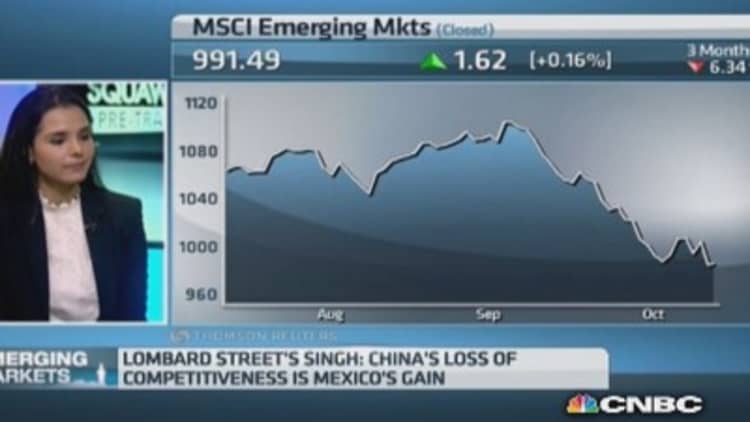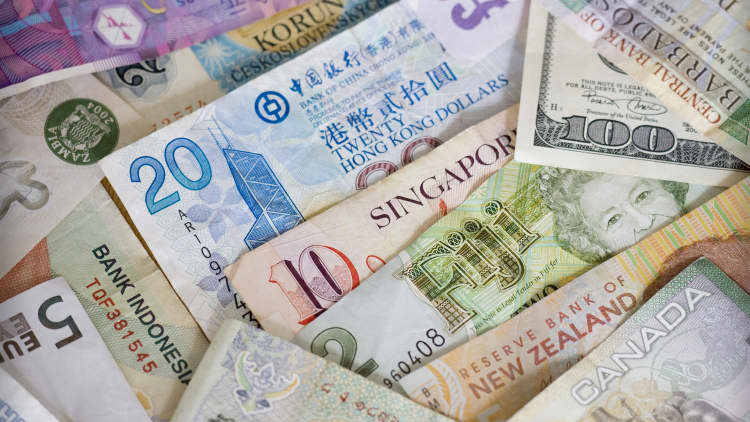Emerging market assets have gotten cheaper, but in the face of four key headwinds, it might not be the right time to buy back in, Barclays said.
"Although emerging-market risk premia generally fell in 2002-07, they rewidened last year in anticipation of the end of QE (quantitative easing). In some cases, such as some fixed income markets and especially in equity markets, that rewidening remains tempting," Barclays said in a note Friday. "But it is no longer obvious to jump back in."
Read More The price of oil is not where Russia would like it
Emerging markets face four key headwinds to regaining momentum, Barclays said.
Firstly, China's economic growth slowed from its average of 11 percent annually over 2002-07 to just 8.2 percent over 2011-13, it noted, adding it expects a further slowdown in 2015 to around 6.9 percent.

That slowdown in China, combined with weak demand in Europe and ample supply of commodities, form the second headwind: weak commodity prices, Barclays said, adding it expects them to fall even further next year.
Read More Why a strong dollar is scarier than taper tantrum
While commodity importers may see some benefits, exporters such as Russia, Chile, South Africa and Brazil face declining inflows of funds. Russia's official 2014 state budget, for example, accounted for oil at $114 a barrel and requires prices around $93 a barrel to break even by year-end, Eurasia data indicated. WTI crude oil is trading around $81 a barrel.
The next headwind comes from interest rates, Barclays said.
"Low interest rates in the developed world helped emerging markets via funding costs. But U.S. interest rates are unlikely to fall further," it said, adding it expects growth there to recovery gradually with the Federal Reserve likely to start raising policy rates in mid-2015. Even without an immediate rate hike, "the end of QE marks an important inflection point for global liquidity which has found a home in emerging markets over recent years."
Read More Bonds are great—in emerging markets
The final headwind is likely to come from currencies, Barclays said.
"Higher U.S. rates and still-low yields in other major economies means that the could face a sustained rally versus major and emerging-market currencies," it said. "Emerging market FX appreciation gains will no longer be the norm."

A stronger U.S. dollar can increase the import bills for emerging markets, potentially offsetting the benefits of lower commodity prices for net importers.
Others are also concerned about U.S. dollar strength, especially in the wake of the Bank of Japan's surprise decision to ramp up its stimulus efforts, increasing purchases of exchange-traded funds (ETFs) and real estate investment trusts (REITs), extending the duration of its portfolio of Japanese government bonds (JGBs), and increasing the pace at which it expands its monetary base.
Read More Emerging markets: The risks markets may be missing
"The Japanese yen should remain under downward pressure, especially as the Fed appeared hawkish this week," HSBC said in a note Friday. "The currency wars are heating up, especially when we consider the risk of further ECB easing is still on the cards."
With this set to both bolster the strength of the U.S. dollar and keep the yen weak, "the BOJ's actions could encourage other policy makers to become more defensive against local currency strength," HSBC said, adding that among emerging markets, it expects exports from Korea and Taiwan may take a hit.
To be sure, some see potential emerging market benefits from weaker commodity prices.
"Commodity price disinflation is an enormous gift to Asian policy makers," ANZ said in a note Thursday. "The extent and complexity of food and energy subsidies across South and Southeast Asia stand out as perhaps the clearest macroeconomic policy failing of recent years."
But declining commodity prices give policy makers the chance to unwind the subsidies with fewer economic and political consequences, it said.
"Unwinding of subsidies could potentially free up as much as 3 percent of GDP in some economies that could be more efficiently allocated to public investment in physical and social infrastructure," ANZ said, adding it expects foreign investors and ratings agencies would take a favorable view of the fiscal improvement.
—By CNBC.Com's Leslie Shaffer; Follow her on Twitter @LeslieShaffer1

